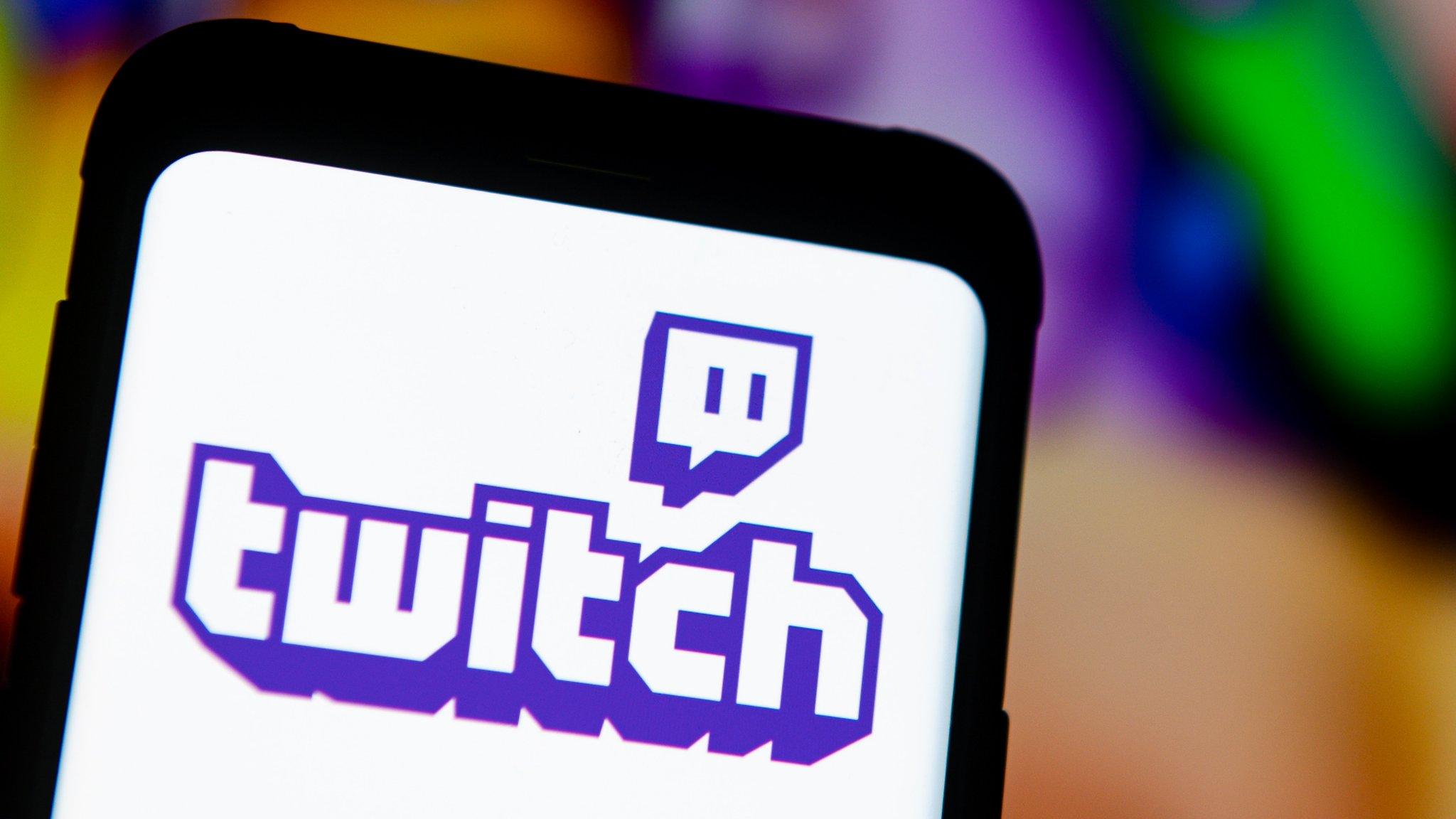Euro 96: The A to Z of the last football championship in the UK
- Published
- comments
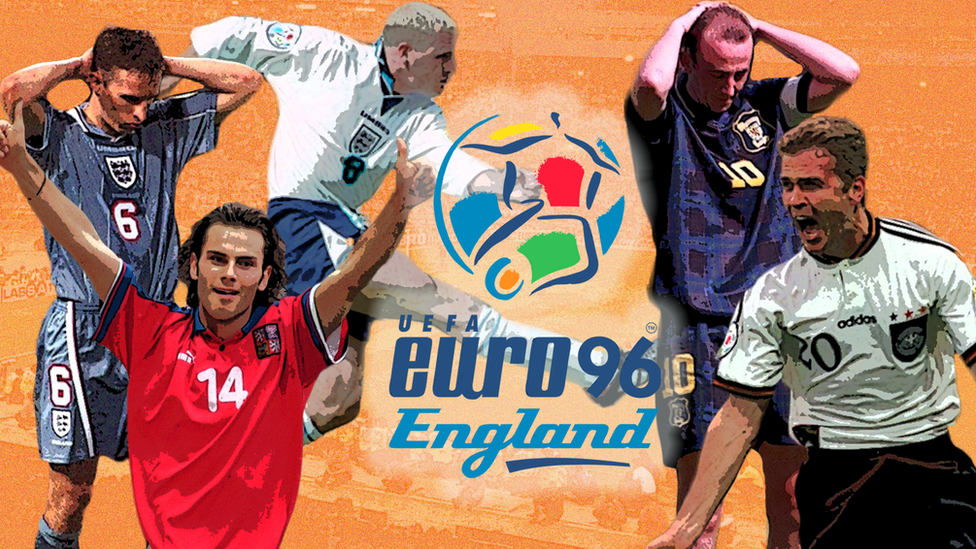
It's amazing how much time you have on your hands when there's no football on.
And, as we wait to hear when it'll be safe for domestic and international football to resume, ITV have decided to re-run one of the most iconic tournaments of all time in full.
The 1996 European Championships - or Euro 96 for short - was the last major international football tournament played on British soil.
Before you decide to get stuck into the action, have a read of our A to Z of everything you need to know about the tournament that people are still talking about 24 years later.
A - Alan Shearer
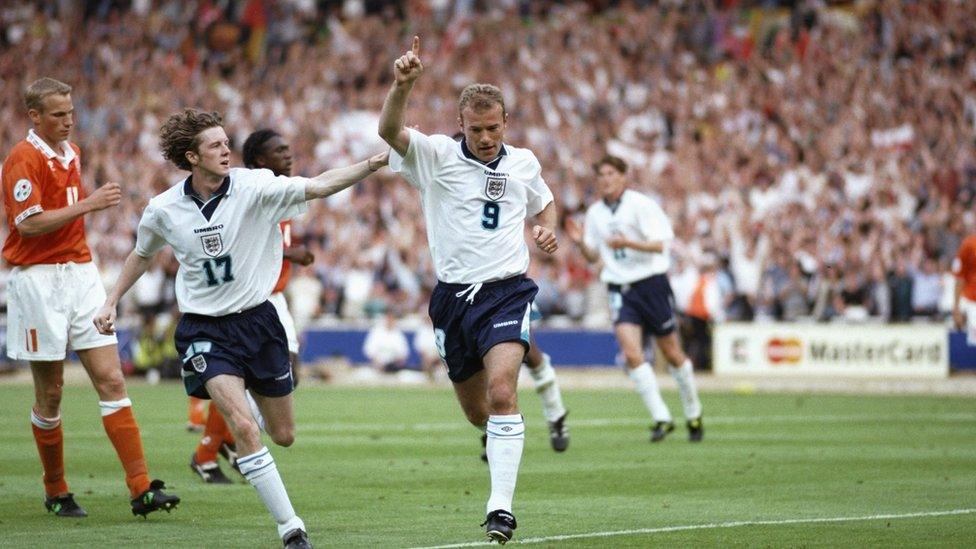
Alan Shearer (pictured, right) scored five goals at the tournament
Before the tournament took place, there were calls for Newcastle striker Alan Shearer to be dropped from the squad because he hadn't scored in 12 matches for England.
To put that in context, England fans hadn't seen him score for nearly two years.
Shearer restored his manager Terry Venables' faith by becoming the top scorer at Euro 96, with five goals.
B - Bierhoff
Oliver Bierhoff was Germany's super sub in the tournament.
The 28-year-old came off the bench in the final and made a decisive impact by scoring the equalizer against the Czech Republic.
Then, with the game going into extra time, Bierhoff scored the golden goal - a new rule which meant whoever scored first in extra time would win the game.
It was Germany's first silverware since the reunification of West Germany and East Germany in 1990.
C - Czech Republic
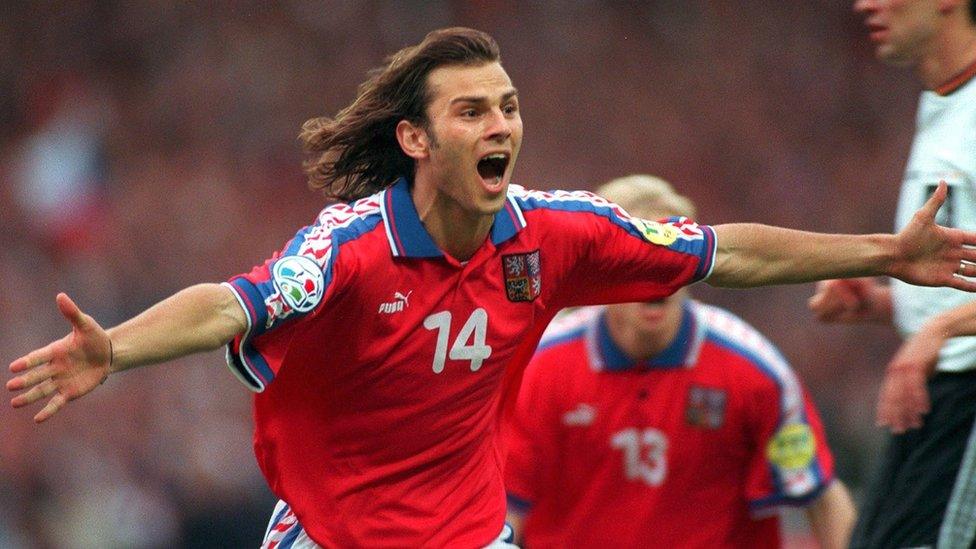
Patrick Berger (pictured) was one of the breakout stars for Czech Republic and made a move to Liverpool after the tournament
Before the tournament started, no-one would predicted rank outsiders the Czech Republic would go very far.
They were one of the lowest ranked teams in the competition but managed to defy expectations by making it to the final.
They took eventual winners, Germany, all the way to extra-time in the final.
D - Dentist Chair
It's one of the most iconic celebrations of all time.
After scoring a wonder goal against Scotland, England midfielder Paul Gascoigne threw himself on the ground and had water sprayed all over him by his teammates.
It was allegedly in response to the England players feeling that they'd been mistreated by the media in the build up to the tournament.
E - England
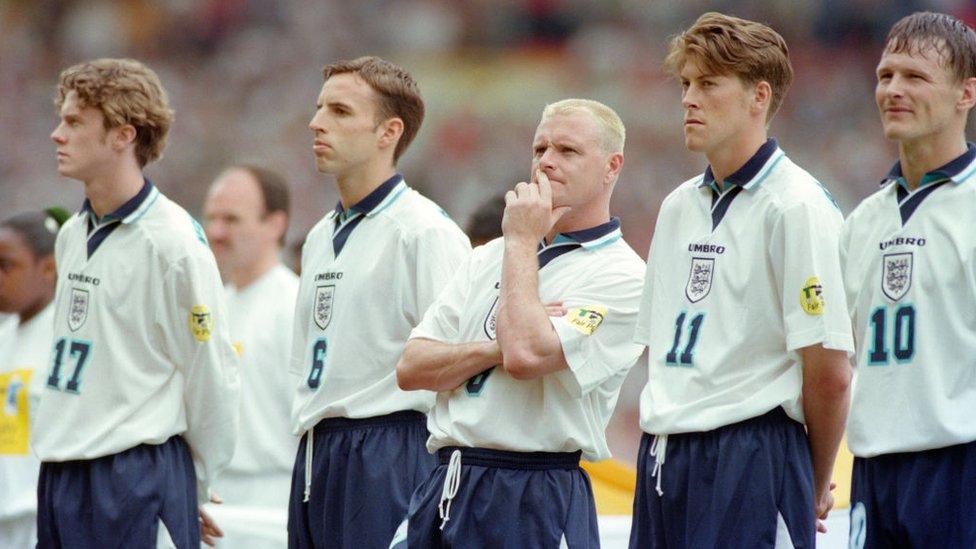
Going into Euro 96, England weren't fancied to do very well.
They'd failed to qualify for the last major tournament - the 1994 World Cup - and the media wrote lots of stories about the squad's supposed bad behaviour off the field.
However, after a rocky start, England defied expectations by making it to the semi-finals of the competition before losing on penalties to Germany.
F - Frank Skinner
TV personalities Frank Skinner and David Baddiel produced a song for the tournament which later became the anthem to England's national team
The song was called Three Lions and it became so popular that its lyrics have been chanted in stadiums all over the country to this day.
During the tournament, it reached number one in the charts.
G - Gazza
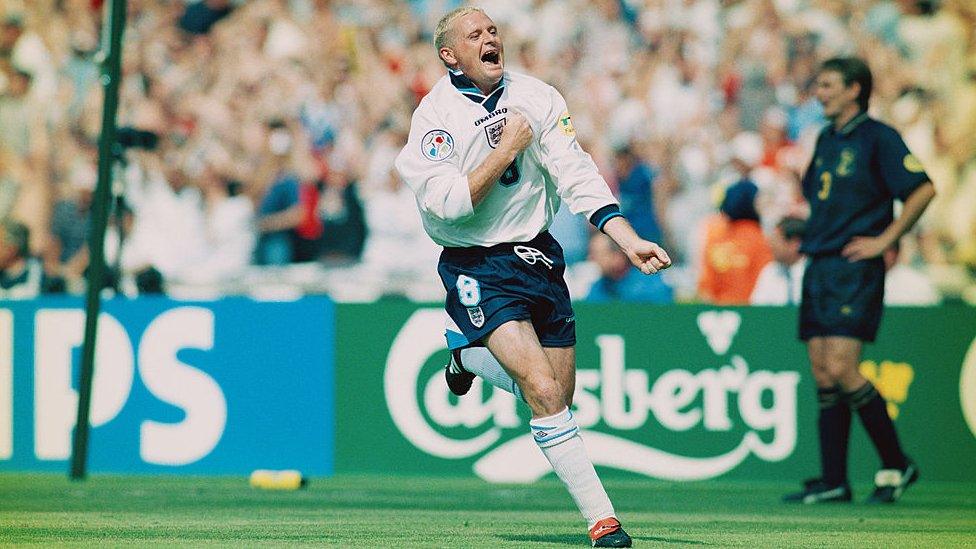
Gascoigne celebrating his wonder goal against Scotland
Paul Gascoigne was England's star man during the tournament.
He was playing in Scotland for Rangers when the tournament came around and there were calls for him to be dropped from the starting eleven because of his behaviour off the pitch.
However, he answered his critics by scoring one of England's most famous goals of all time against arch rivals Scotland.
H - Host nation
It was the first time England had held a major tournament on home soil since winning the 1966 World Cup.
Despite this, lots of fans didn't seem that keen and attendances to the early rounds of matches were quite low in some places.
Matches were played in Birmingham, Leeds, Liverpool, London, Manchester, Newcastle, Nottingham and Sheffield.
England's matches were always a sell-out however and at home, almost 24 million people watched England's semi-final penalty defeat to Germany on the TV.
I - Italian woe
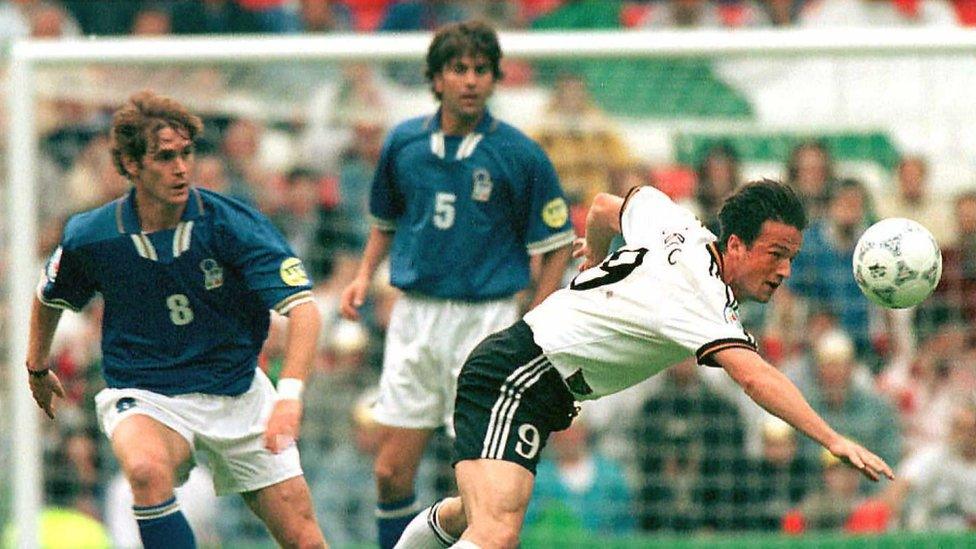
On paper, Italy were one of the strongest teams in the tournament because they'd been in a World Cup final just two years previous.
Also, at the time the Italian Serie A division was the most competitive and wealthy league in the world.
Despite having the likes of Maldini, Zola and Del Piero at their disposal, the Italian crashed out in the group stage.
J - Jazzy kits
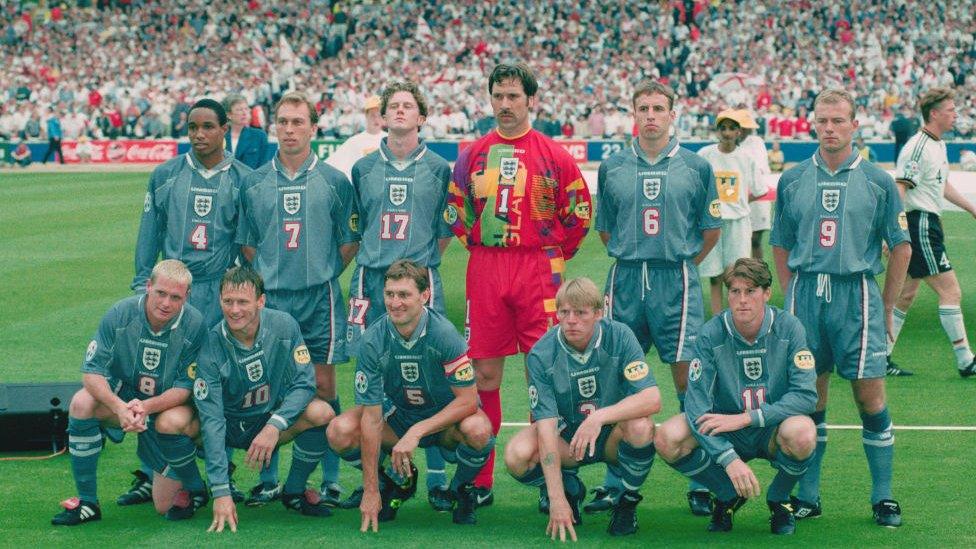
David Seaman's goalkeeper shirt was really out there
Nothing summed up nineties football more than the jazzy kits on show during the tournament.
David Seaman's goalkeeper shirt, in particular, had a mixture of red, green, purple and yellow on it.
K - Klinsmann
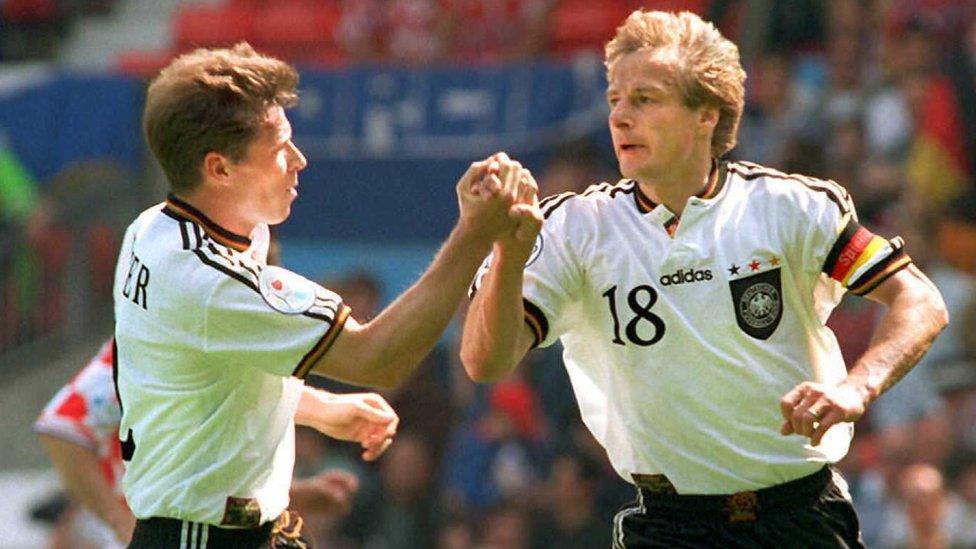
Jurgen Klismann (pictured, right) was Germany's captain
Jurgen Klinsmann was one of the best known foreign players at the tournament because he'd played for English side, Tottenham Hotspur.
He came to the tournament as Germany's captain, scored three times and led his side to victory against Czech Republic in the final.
L - Legacy
24 years on, people still talk about the tournament as the last time England should have won a major international tournament.
Lots of experts think they outplayed Germany in the semi-final and were unlucky not to make it into the final where they would have faced the un-fancied Czech Republic.
England came close again at the 2018 World Cup but in that semi-final they were comprehensively beaten by Croatia.
M - McAllister
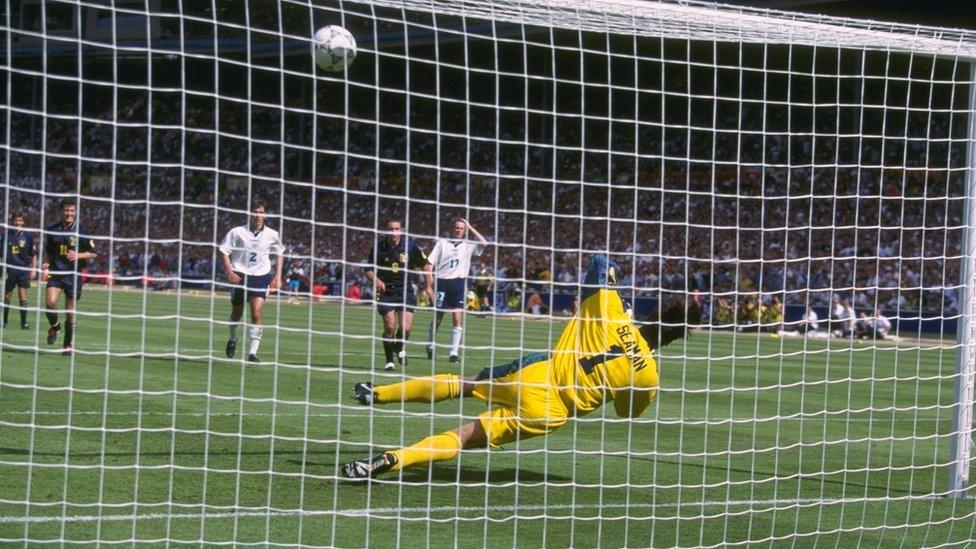
Scotland captain Gary McAllister (pictured) seeing his penalty saved by England keeper, David Seaman
Scotland captain Gary McAllister led his country into battle with arch rivals, England, at Wembley knowing that they had the opportunity to all but dump out the hosts with a victory.
With the score at 1-0 to England, Scotland were given a penalty and McAllister had the opportunity to turn the game.
Unfortunately for him, England keeper David Seaman had other ideas and saved the penalty.
Less than 90 seconds later, England had gone down the other end and added a second.
N - No hopers
It wasn't just the Czech Republic who did well despite their pre-tournament status as no hopers.
Croatia were also relatively unknown because it was their first appearance at a major tournament.
They managed to get to the quarter finals and striker, Davor Sukor, was named in the team of the tournament.
O - Oranje
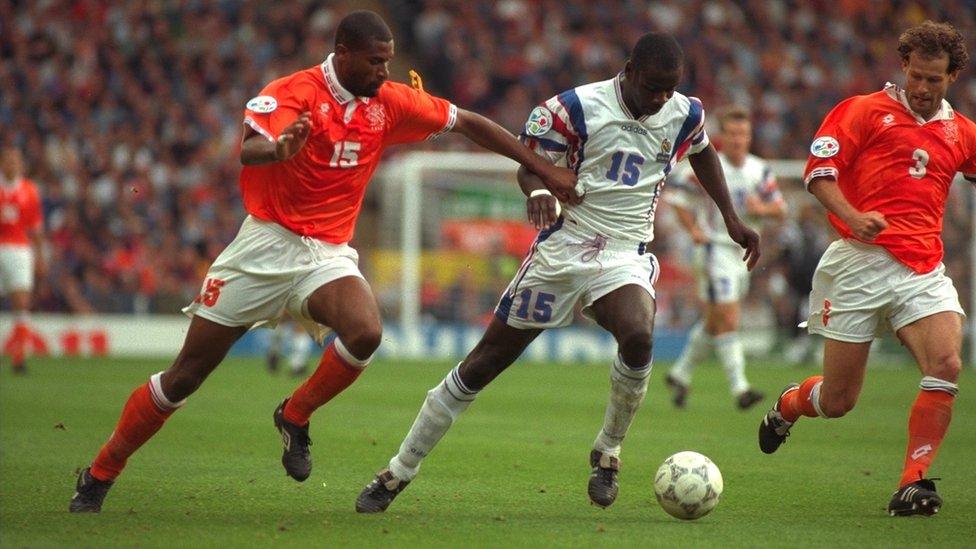
The favourites going into the tournament were the Netherlands, well known by their nickname, the Oranje, due to their famous kits.
They had some of the best players in the world at their disposal, with lots of the line-up playing for 1995 Champions League winners, Ajax.
However, tensions over salaries within the squad meant that it wasn't a happy camp.
England defied expectations by beating the Netherlands 4-1 in the group stage.
The consolation goal in that match dumped Scotland out of the tournament.
However, the Netherlands didn't make the most of their good fortune and they were dumped out France on penalties in the quarter finals.
P - Pay the penalty
England went out on penalties to Germany in the semi-final against Germany after the two sides couldn't be separated.
Gareth Southgate - who is the current England manager - became a scapegoat for the defeat after his weak penalty was saved and England were knocked out.
He later starred in an infamous advert that poked fun at his miss by making him wear a paper bag over his head.
Q - Quarter final
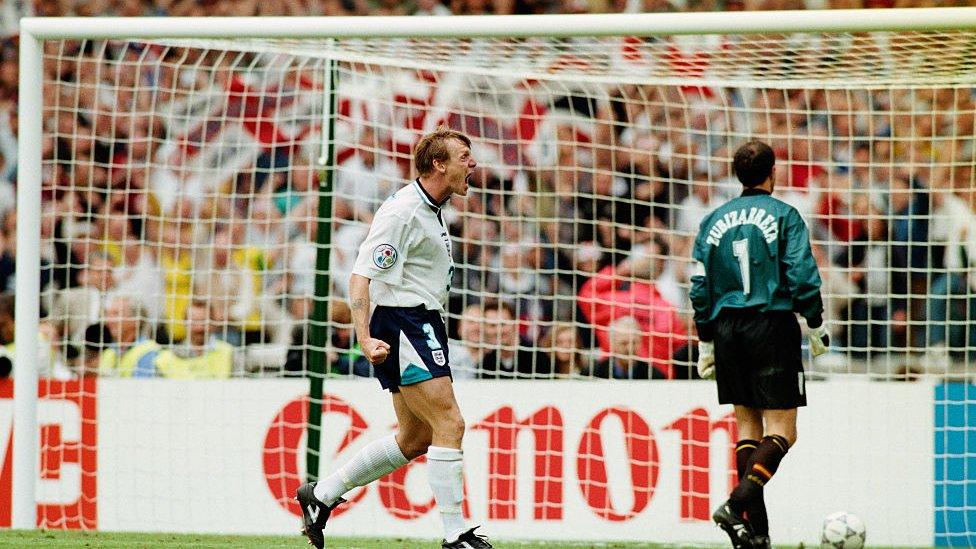
Stuart Pearce scored the decisive penalty against Spain in the quarter finals
Believe it or not, going into the semi-final, England were actually coming off the back of a penalty shootout success.
England beat Spain on penalties after neither side managed to score in 120 minutes of play.
David Seaman was the hero, saving the final penalty from Spain's Miguel Nadal (yes, he's tennis star Rafa's uncle).
R - Ravanelli
From Champions League winner to Premier League struggler, everyone was surprised when Middlesbrough managed to sign Ravanelli from Juventus following Euro 96.
The silver haired Italian striker had scored the winner in the Champions League final against Ajax just months earlier.
Middlesbrough paid £7 million to bring him in - a lot of money at the time.
S - Scotland
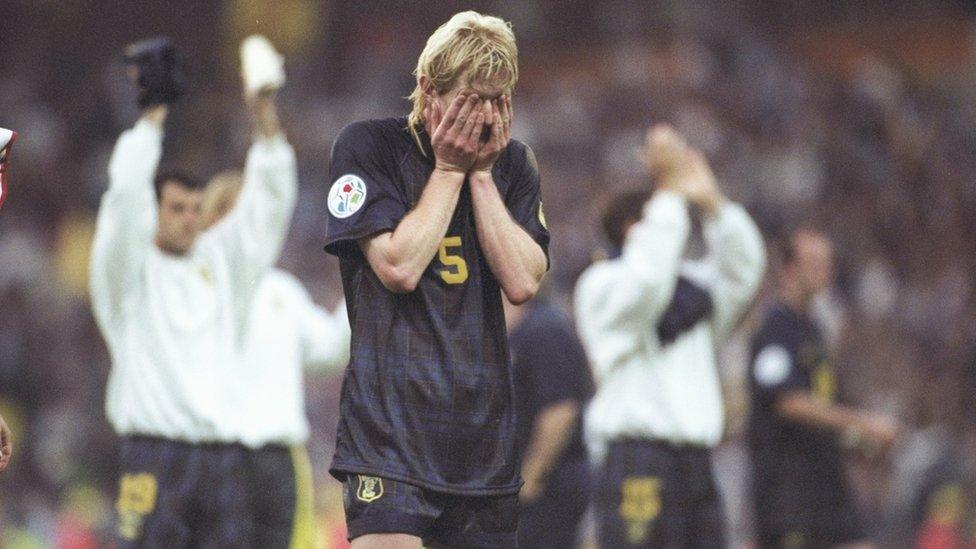
Scotland started really well in the tournament by earning a surprise draw against tournament favourites the Netherlands in the first match.
However, a 2-0 loss to England in the second match meant that Scotland needed a result against Switzerland.
A goal from Ally McCoist gave them a 1-0 victory.
When the Netherlands went 4-0 down against England, it seemed almost certain that Scotland would make it through.
However, a goal from Netherlands striker, Patrick Kluivert, sent the Scots crashing out because the Dutch had scored more goals in the competition.
T - Tunnel
England midfielder, Darren Anderton, recently revealed that England planned to run straight down the tunnel if they scored a goal in extra-time against Germany.
The golden-goal rule was in place for the tournament and this meant the first team to score would have won the match.
U - Upset
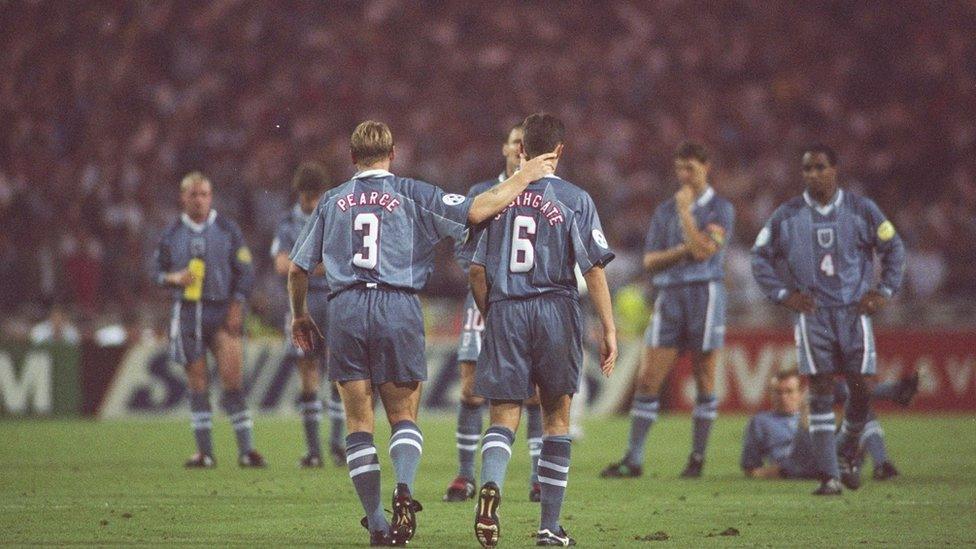
The feeling of millions of England fans after their side was knocked out by the Germans.
Just like six years before at the 1990 World Cup, England had been knocked out on penalties by the Germany at the semi-final stage.
At this point, England hadn't won a major competition for 30 years.
V - Venables
Terry Venables was England's manager during the tournament.
He had replaced Graham Taylor after England failed to qualify for the 1994 World Cup.
W - Wembley
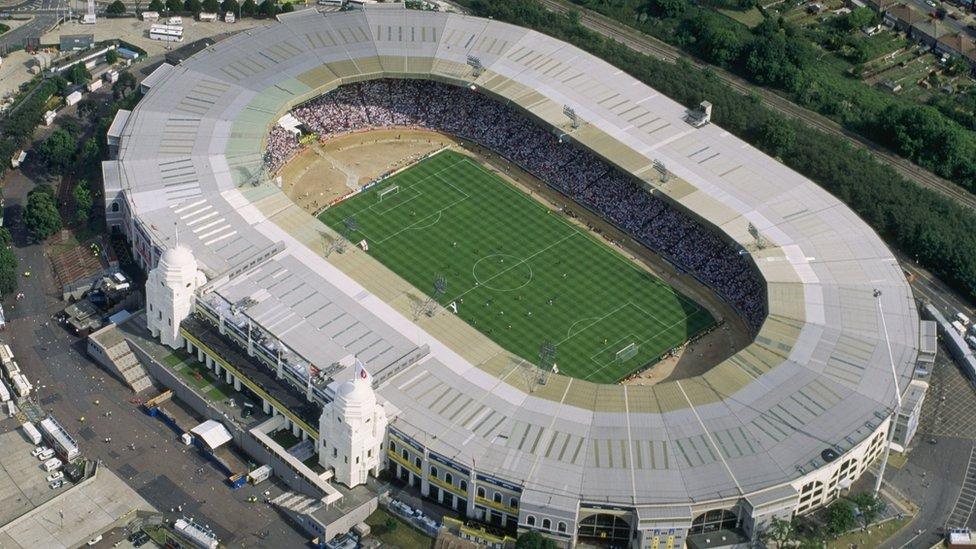
The old Wembley stadium played host to all of England's matches during the tournament.
It also hosted the final of the competition, where 74,000 people saw Germany beat the Czech Republic.
X - Neuchatel Xamax
Okay, you got us here. X was a difficult letter to do.
However, three players in the Switzerland squad came from a team called Neuchatel Xamax.
It doesn't stop there though. One of the Romanian side played there too. But yes, X was tricky!
Y - Yards away
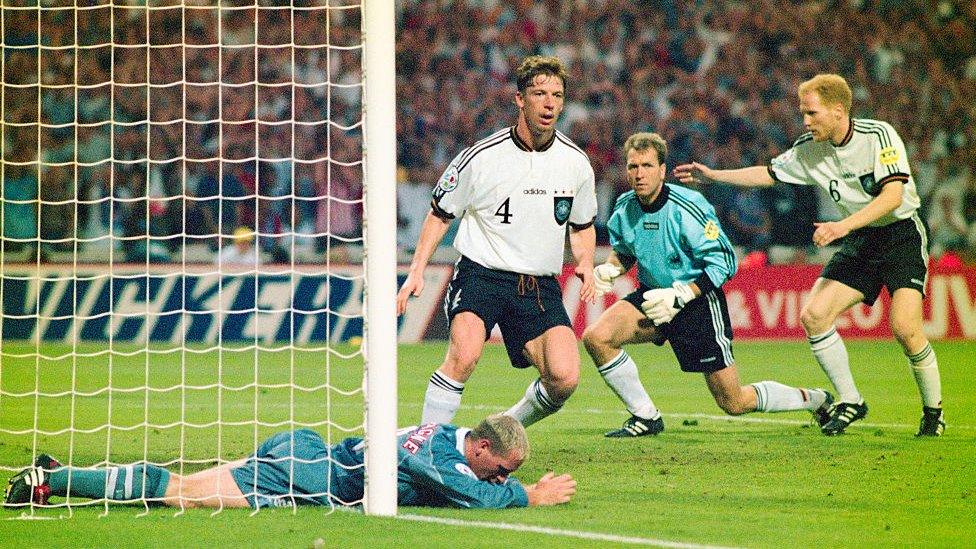
Paul Gascoigne could have won the semi-final for England against Germany if he had been just a yard further forward.
The chance came in extra time and because of the golden goal rule it would have booked England's place in the final.
Z - Zidane
France were emerging as a top team in Europe with some of the most exciting young players in world football.
A new star called Zinedine Zidane emerged in the months leading up the tournament following the suspension of Eric Cantona.
Cantona had been suspended from football for year after stamping on a fan when playing for his club side, Manchester United.
Two years after Euro 96, Zidane helped France to the 1998 World Cup title.
You might have heard of him now, he's currently in charge of a team in Spain called Real Madrid.
- Published15 May 2020
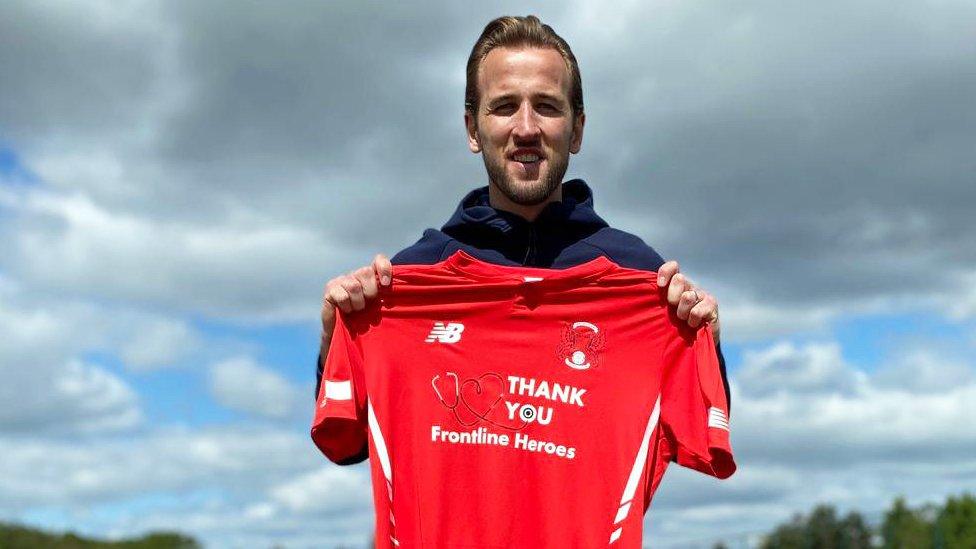
- Published19 May 2020
